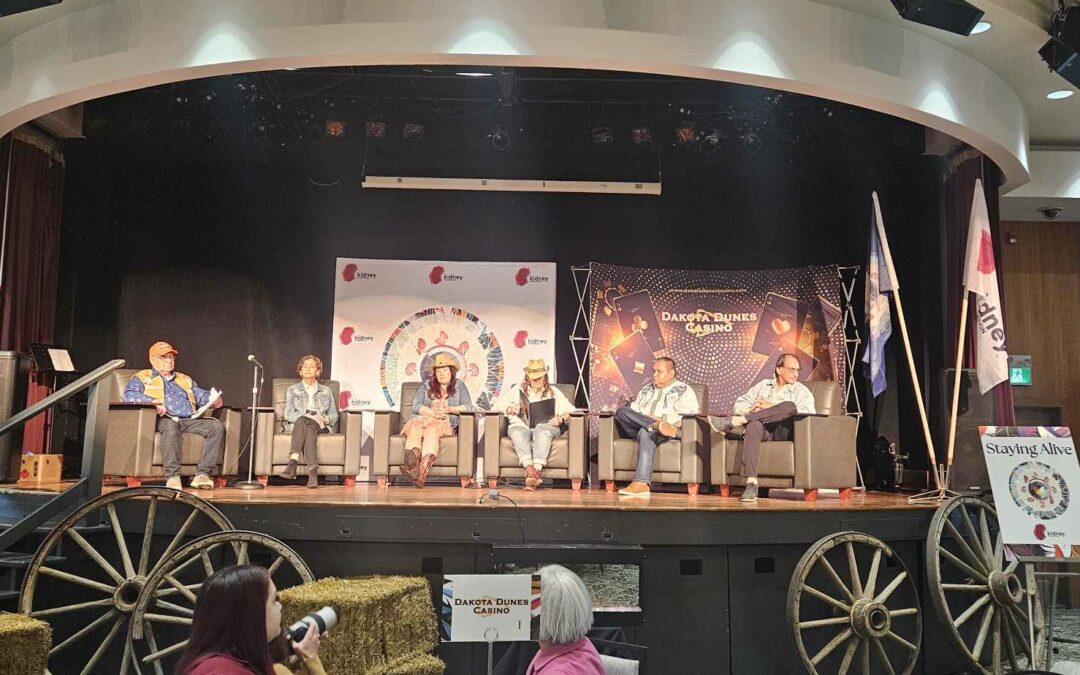The 2nd annual Staying Alive Fundraiser at Dakota Dunes: a resounding success with a $190,000 financial investment from the Kidney Foundation of Canada to reduce the burden of chronic kidney disease in Indigenous patients in Saskatchewan.
Sasipenita and the Kidney Foundation of Saskatchewan collaborated to make this event a resounding success. The organizations worked together to raise funds and awareness for Indigenous kidney patients in Saskatchewan.
“The Kidney Foundation of Canada is committed to the calls for action, specifically those related to help. We’re committed to reducing the burden of chronic kidney disease. The rate for Indigenous adults is one in three,” said Executive Director of the Kidney Foundation of Canada Joyce Van Deurzen.
The evening was a night full of life, laughter, some tears, and glitzy country western attire. It kicked off with a grand entry of special delegates, which included organ donors, organ recipients, and patients still waiting for the gift of life. The evening treated the guests to a fabulous dinner, games, a silent auction, and a dance.
Guests were inspired by discussions from living donors, recipients, and patients still waiting for an organ donation. The insightful fireside chat was moderated by Elder Tom Roberts, with guests: Crystal Marinuk, a kidney transplant donor; Kevin Peeace, currently on hemodialysis; Patsy Chell, a double lung transplant recipient; Bruce Sinclair, a liver transplant recipient; and Shammi Rathwell, a heart transplant recipient.
All of the talks were impactful, and they shared their personal experiences.
Crystal Marinuk has a son with type 1 diabetes and a partner with kidney disease, and she describes her personal conflict when she got the news that she was a match with her fiancé.
“There was something weighing really heavy on me. I thought right away, What about my son? What if he someday needs a kidney? So, it was a rollercoaster that I went through, and I am going to talk to him, and it’s going to be his decision and mine,” explained Marinuk. “I remember getting on the phone and having the conversation. He’s like, Mom, I don’t need a kidney right now. I said, I know my boy, but what if you need it? and he said, Mom, why would you hesitate if you could save somebody’s life right now? You have to do it, and when the time comes later, we’ll go through that later, but you can save his life, and that’s what I needed.”
The fireside chat evoked emotions, inspired, and captivated the audience.
Kevin Peeace, who is currently on hemodialysis, shared what his experience has been like learning about his condition.
“When I got the news, it was pretty devastating. The first thing I said was, I apologized to my wife. I apologized to her because I knew that there was a very real possibility that the writing was on the wall. That was the first one: realization, guilt, and anger,” said Peeace. “It’s been tough, and I have been on it for about a year and a half, and I’m positive about it. It’s a life-changing experience.”
There was a recurring theme that was spoken, and that was that the love, faith, and support of family were very impactful in their ability to aid in their care and recovery. Hearing these stories increased the importance of educating and informing Indigenous communities to watch for signs of their health and to consider being organ donors.
(Photo of the Fireside chat by Amber Bear)
